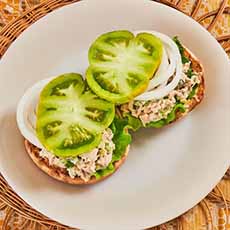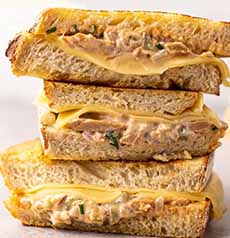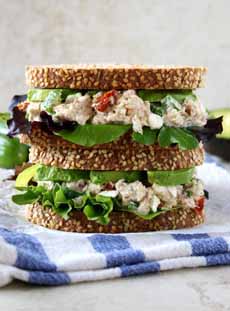Sustainable King Oscar Yellowfin Tuna Fillets For World Tuna Day
|
|
Each year on May 2nd, World Tuna Day is celebrated to spread awareness about the imperiled tuna stock, and the need to adopt sustainable fishing practices to save this endangered species. The high demand for tuna, canned and fresh, has created a worldwide shortage, with fewer tuna pulled from the ocean each year. The World Tuna Day was officially proclaimed by the United Nations General Assembly in December 2016. Its aim was to spotlight the importance of conservation management and make sure that a system is required in place to prevent tuna stocks from crashing. Efforts are underway, but the challenge remains: How to fill enough cans of tuna to meet consumer demand while ensuring there are enough fish left in the ocean to replace those that are caught. Today’s product focus is King Arthur, a sustainable brand of yellowfin tuna. Check out sustainability terms, below. Check out the creative tuna salad recipes below. > Albacore vs. yellowfin tuna: the difference. King Oscar is a producer of “ultra-premium” jarred and tinned seafood: anchovies, kippers, mackerel, sardines, and yellowfin tuna. The King Oscar brand was established in 1902, when King Oscar II, monarch of Norway and Sweden, gave a small Norwegian canning company special royal permission to use his name and image on a line of superior sardines. The brand champions sustainable seafood: wild-caught and dolphin-safe. It is backed by SeaChange, an integrated plan of initiatives to drive meaningful improvements across the entire global seafood industry. Here’s more about the brand’s sustainability efforts. The yellowfin tuna (photo #1) is far removed from a can of Bumble Bee. Tender fillets of select yellowfin tuna are marinated in 100% top-quality extra virgin olive oil, with herbs and spices. There are four varieties: The firm fillets encourage inclusion on antipasto plates, tapas, and other recipes where the flaked tuna in cans won’t do. Give your taste buds the royal treatment with King Oscar! The world tuna population is endangered: Due to the popularity of tuna, several of the major species are on the endangered species list. Learn more about it here. U.S. fisheries are taking the lead in sustainable tuna fishing. These terms will explain both the situation and the solution: Fewer Food Miles: Caught in the Pacific Northwest and canned at local canneries in Oregon, Washington, and California, the distance U.S. albacore travels from ocean to plate is significantly lower. Fewer Trace Metals: With tuna, the larger the fish, the higher the amounts of accumulated metals, including mercury. Trolling catches younger and smaller albacore weighing between 5 and 15 pounds. These juvenile albacores have significantly lower levels of mercury. The Oregon State University conducted a study in 2004 to determine mercury levels of North Pacific troll-caught albacore. These tuna were found to have low total mercury concentrations (average 0.14 ppm), very low compared to the 1.0 ppm methylmercury action level set by the FDA and comparable to “light tuna” or Skipjack. Omega-3 Fatty Acids: Get up to six times the heart-healthy omega-3s from your tuna sandwich. Cooked just once in the can, custom-canned U.S. albacore retains all its good fats (omega-3s). Health experts recommend eating omega-3-rich fish, including albacore, at least twice a week. According to the American Heart Association, research on omega-3s suggests they may reduce the risk of diabetes, reduce insulin resistance in people with diabetes, enhance bone density, inhibit the proliferation of cancer cells in the breast, prostate, and colon, and aid in curbing psoriasis. Inflammatory diseases such as rheumatoid arthritis, ulcerative colitis, and Crohn’s disease seem to improve with more omega-3s. In infants, they improve cognition and visual acuity. Sustainably And Ethically Caught: Trolling is a low-impact method where small, barbless hooks are used to catch albacore one at a time. The Monterey Bay Aquarium’s Seafood Watch program gives U.S. troll-caught albacore a “green” rating, the highest obtainable. Trolling is one of the most environmentally-sound fishing methods. For a full explanation, visit Monterey Bay Aquarium’s website. U.S. fisheries are some of the most regulated in the world; fishers must adhere to strict environmental regulations and quotas which ensure the ongoing health of the marine environment. |
|
|
|
||









